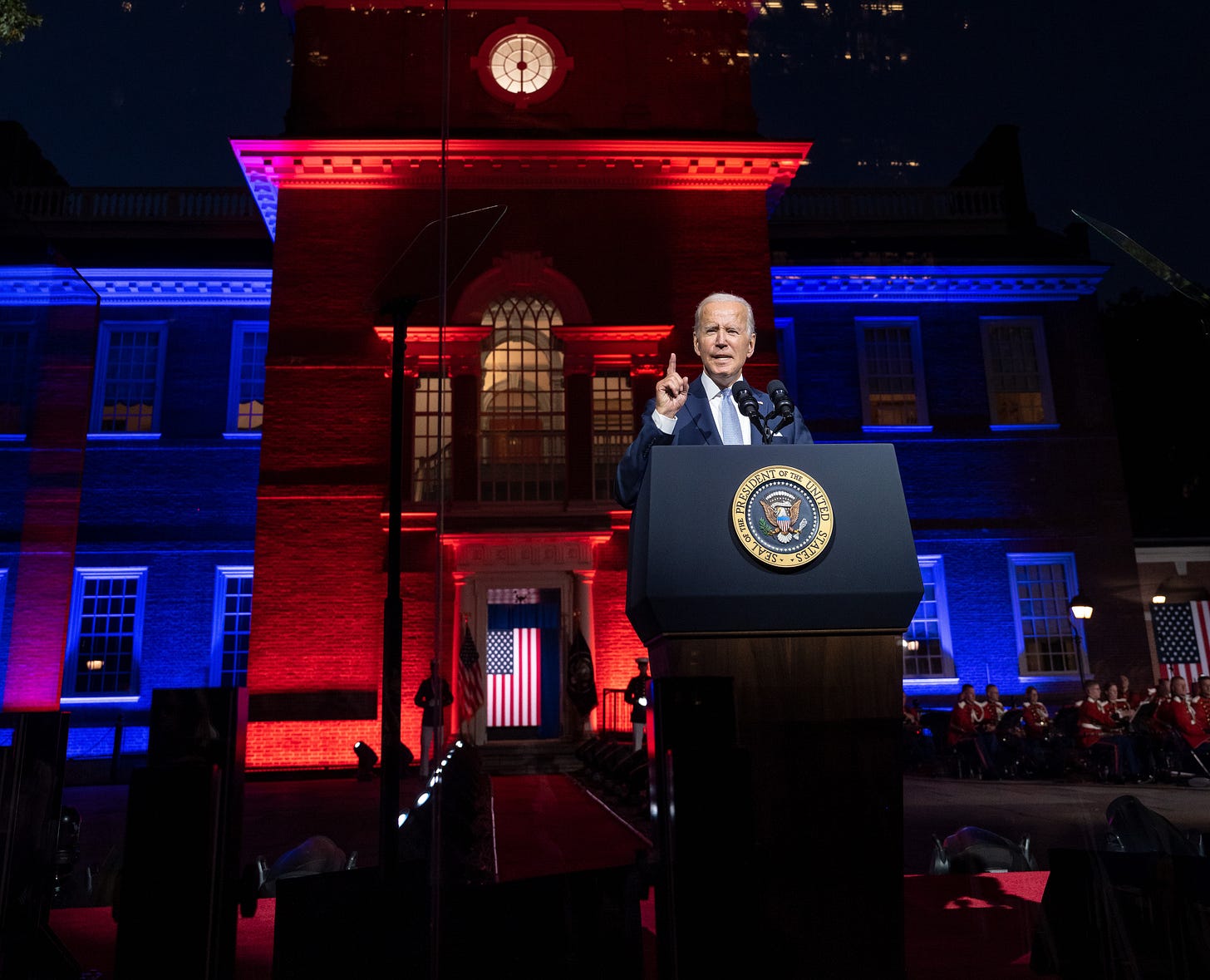If the Public Turns Against Trump, It Won't Be to Save Democracy
Remember when Democrats tried to appeal to the electorate's better angels?

Thank you for reading The Cross Section, and if you find my work valuable and would like it to continue, consider becoming a paid subscriber. This site has no paywall, so I depend on the generosity of readers to sustain the work I present here. Thanks.
A month into his presidency, Donald Trump is doing pretty much what he said he would do, albeit with a speed, lawlessness, and cruelty few imagined would be possible. And the public is just starting to wonder if this was what they signed up for.
A backlash to Trump has already begun; how strong it will become and how sustainable it will be, we do not yet know. But if you would like to see that backlash grow, keep this in mind: If and when the public rejects Trump, it will likely be for the most narrow and parochial reasons.
But before we get to that, let’s remember how we got here. For a couple of years leading up to the 2024 election, the political and media environment was awash in warnings about the fragility of American democracy and what could happen if Trump became president again. Given the events of the last month, it’s clear that those of us frantically waving our arms and shouting about Trump’s fascist tendencies were, if anything, underplaying the danger.
But even as those warnings grew in volume, there was little indication that the voting public was convinced. The discussion was either too high-minded and abstract, or when it got specific, too wonky and concerned with institutional processes most people found inscrutable or just boring. Nevertheless, many hoped that if the public could be made to understand the stakes, they would do the right thing. Consider the prime-time speech President Biden gave about the threat to democracy in September 2022, which he loaded up with praise for the nobility and wisdom of the American people. Here’s how it ended:
If we do our duty in 2022 and beyond, then ages still to come will say we — all of us here — we kept the faith. We preserved democracy. We heeded not our worst instincts but our better angels. And we proved that, for all its imperfections, America is still the beacon to the world, an ideal to be realized, a promise to be kept. There is nothing more important, nothing more sacred, nothing more American. That’s our soul. That’s who we truly are. And that’s who we must always be.
Unfortunately, relying on Americans to heed their better angels has seldom turned out well. Despite Trump’s open and repeated insistence that he would use the levers of government to punish his enemies, reward the violent insurrectionists of January 6, destroy the nonpartisan civil service so he could substitute it with cronyism, appoint unqualified and unprincipled hacks to powerful posts, and generally run the most corrupt administration in history, the voters said “Grr, eggs are expensive!” and voted him in.
People are beginning to tune in
Those same voters are not going to turn around and decide that the shape of our national soul and the delicate balance of the separation of powers are suddenly top priorities for them. But that doesn’t mean they’re happy.
While there hasn’t yet been a wholesale rejection of Trump and Trumpism, public opinion is moving against him. His approval ratings are trending slowly but steadily downward, with many polls showing him in negative territory; the only prior president who failed to get any kind of honeymoon at the beginning of their term was Trump himself, the first time around. Majorities even disapprove of his handling of the economy; just imagine how they’ll feel if his tariffs, deportations, and mass firing of government employees plunge us into a recession.
Elon Musk is even more unpopular than Trump himself, and will probably get less popular still as people learn about the impact his dismantling of government agencies will have on their own communities. We’re already seeing Republican members of Congress in safe districts besieged by constituents at town hall meetings who are livid about the cutbacks; if they didn’t realize before that there are federal employees and federally-funded programs right where they live, they’re getting the picture now. (If you’re curious or would like some information to aid your own political participation, you can use this handy tool to see how many federal workers there are in your state, county, or congressional district.)
Meanwhile, the policy moves Republicans have teed up are likely to produce enormous displeasure, if the public actually hears about them. For instance, Trump’s own pollster conducted a poll of swing districts that found 80% of respondents favoring extending the Obamacare credits that allow people to afford health insurance; cutting those subsidies is one of the options Republicans are considering in order to pay for extending tax cuts for the wealthy and corporations.
Congressional Republicans also seem determined to enact brutal cuts to Medicaid, a program that provides health coverage to 72 million Americans (with another 7 million on CHIP, the subsidiary program for children). They believe that unlike Medicare and Social Security, which politically engaged senior citizens will defend with all the fury they can muster, Medicaid’s constituency is both poor and politically demobilized, and therefore powerless.
But this is a mistake. In fact, Medicaid is enormously popular with its recipients, and two-thirds of Americans have either had it themselves or have a family member who did. When Republicans tried to repeal the Affordable Care Act in 2017, which would have kicked millions off their Medicaid, there were dramatic protests against the move (especially by disability advocates) and there likely will be again. With nearly one in four Americans on Medicaid or CHIP, the number of affected people and their loved ones is absolutely enormous.
And these cuts are being justified as the price that must be paid for an extension of Trump’s 2017 tax cuts for corporations and the wealthy, which when it was passed was one of the most unpopular major bills in history.
When the cuts come for you
Conservatives always face a problem when they try to enact their plans to cripple the safety net and hack away at government: People like their government benefits, and they like the things government does. Say we need to rein in government spending and people nod their heads; say you want to cut their Social Security and they revolt. It’s easy to criticize faceless “government bureaucrats,” but when my neighbor Alice the devoted park ranger gets laid off, I’m not happy about it.
Which brings us back to where we started. Those of us who are horrified by everything Trump is doing should realize that for a lot of Americans, only some of it is bad. They don’t really care much about democracy as a foundational principle, and they’re likely to view Trump’s most lawless and even fascistic actions through the prism of the outcome. If he’s breaking the law to do something they like, they’ll say, “Sounds good to me.” If you tell them they should be upset because Trump violated the law in firing members of the Equal Opportunity Employment Commission, you’ll be met with blank stares.
There’s a theoretical version of this presidency in which the damage is far more limited than what we’re beginning to see and doesn't touch ordinary people much. A President Trump who simply pursued his enemies, rewarded his friends, and used his power to enrich himself could be fairly popular, so long as the economy performed reasonably well. But in this version, Trump and Musk are rampaging wholesale through the government, creating harms that will be visible to more and more voters.
I’ll be overjoyed if the net result of this period is that Americans come to a new appreciation for all the good things government does, understand how close we came to a fascist takeover, and reject conservatives’ simplistic and misleading anti-government appeals forever more. But that’s almost certainly not going to happen. If they turn against the administration and the Republicans who run Congress just because they’re mad about the price of eggs and the fact that when they visit a national park this summer there’s no more staff to clean the toilets? That’ll be good enough.





The people will never rise up to save Democracy because let's be real, they have no idea what it means nor why it matters. Perhaps if conservatives hadn't worked so hard to get rid of civics as a required class things would be different, but here we are. At this point none of us should care what wakes them up, we need them to wake up. And we need them to do something that they need to do, vote their own self interest, not what they have thought of as their self interest - Jesus, guns and billionaire tax breaks. And our job now is to link billionaire tax breaks directly to the government programs they depend on that are now in peril. Let's remind the farmers that they aren't getting paid because Musk killed USAID because he wants the money. And when he kills FEMA and NOAA, let's remind hurricane and tornado victims that there is no money for them because it was given to Musk, Bezos and Zuckerberg. Make it personal. Make it easy to understand. Be relentless in pounding the message.
"Unfortunately, relying on Americans to heed their better angels has seldom turned out well."
As hard as it may be for some to do, liberals and progressives must accept that there is deep and wide streak of bigotry and willful ignorance in this country that is impervious to policy nostrums and appeals to the greater good. We have to hammer on threat that the Musk/Trump administration poses to everyday lives. Talking about abstractions such as foreign policy should be in terms of the values most people believe that they as individuals have.
When we do offer policy, we should look to out-of-the-box proposals that pay off to everyone and that don't require voters to ad 2+2+2. Why not Social Security for All? That's a heck of a lot easier to grasp than Medicare for All.